After the Storm
A new web feature looks at climate change, planned relocation, and people with disabilities in Siargao, Philippines.
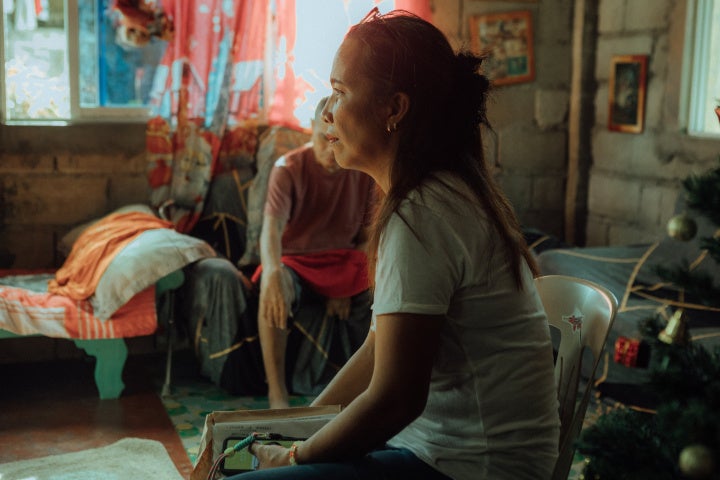
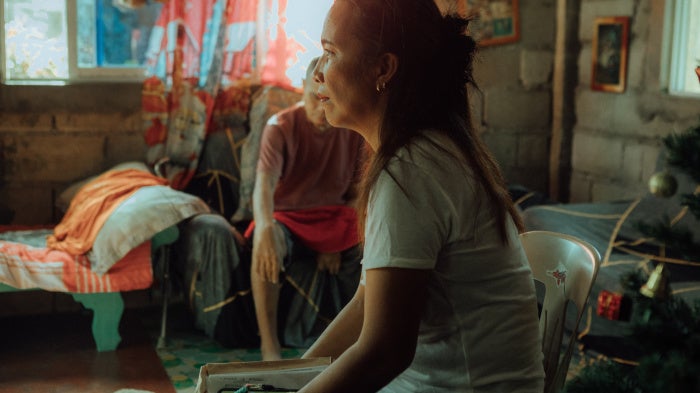
A new web feature looks at climate change, planned relocation, and people with disabilities in Siargao, Philippines.


The 85-page report, “Farmers Have no Freedom: Abuse and Exploitation of Cotton and Wheat Farmers in Uzbekistan,” documents abusive conditions under which these farmers work, including mandatory quotas for crops on land they lease from the government, to be sold at centralized set prices, enforced through penalties for not meeting the quotas, even though required yields may not be achievable. Authorities use threats and violence against farmers who do not meet the quotas, and penalties may include seizing the land. Farmers face non- or late payments by cotton-textile and wheat companies, while authorities have failed to enforce court orders compelling the companies to pay.
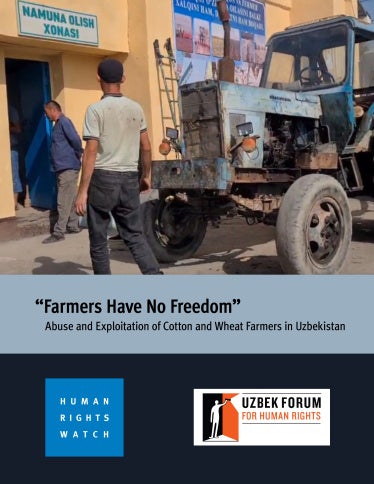
The 47-page report, “‘Silencing the Streets’: The Right to Protest Under Attack in the UK,” documents that the UK’s Labour government has failed to reverse sweeping anti-protest laws introduced by the previous Conservative government. Instead, Labour has attempted to expand them with the Crime and Policing Bill 2025 and through the unprecedented misuse of terrorism legislation to target and criminalize peaceful protest. The Crime and Policing bill, pending before parliament, is to be debated in the House of Lords in January 2026.
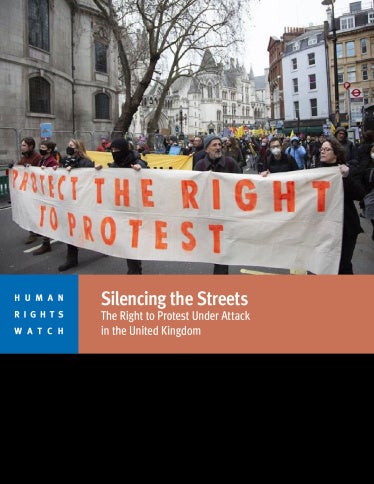
The 45-page report, “Like a Prisoner in My Home’: Coal Fueling Toxic Air in Bulgaria” analyzes the data revealing alarmingly high air pollution levels in Dimitrovgrad, a town in southern Bulgaria, which hosts Maritsa 3, one of the country’s oldest coal plants. Maritsa 3 emits hazardous air pollutants, which contribute to poor air quality that harms the health of local residents, particularly children.
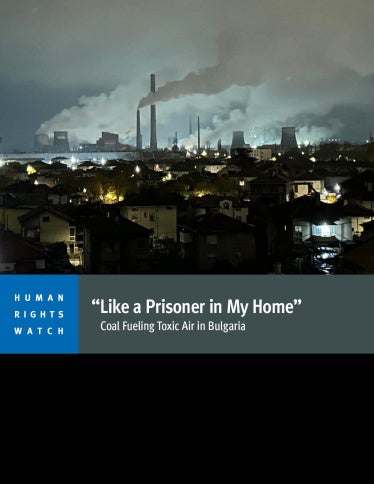
The 50-page report, “‘We Need U’: How the U Visa Builds Trust, Counters Fear, and Promotes Community Safety,” finds that the administration’s deportation policies undermine federal visa programs that provide a pathway for crime victims to obtain legal residency when they cooperate with law enforcement. Changed enforcement guidance, such as allowing Immigration Customs Enforcement (ICE) officials to apprehend people in previously safe places like courthouses and health centers, is a strong deterrent for immigrants who might otherwise report crime to police or seek a protective order.
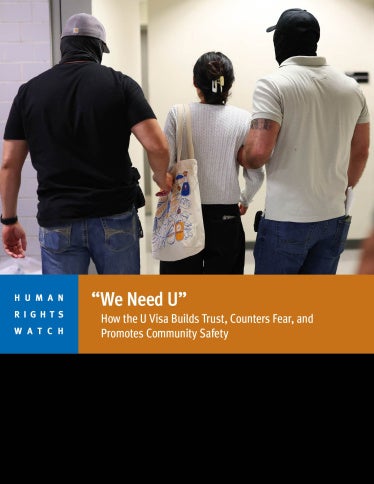
The 105-page report, “‘All My Dreams Have Been Erased’: Israel’s Forced Displacement of Palestinians in the West Bank,” details “Operation Iron Wall,” an Israeli military operation across Jenin, Tulkarem, and Nur Shams refugee camps that began on January 21, 2025, days after a temporary ceasefire was announced in Gaza. Israeli forces issued abrupt orders to civilians to leave their homes, including with loudspeakers mounted on drones. Witnesses said soldiers moved methodically through the camps, storming homes, ransacking properties, interrogating residents, and eventually forcing all families out.

The 73-page report, “Exceptional Failure: France’s Persistent Education Shortcomings in Mayotte,” finds that Mayotte’s municipalities often impose significant and arbitrary barriers to school enrollment, including by demanding documentation not required by law. Children who are enrolled often attend overcrowded schools ill-equipped to meet their basic needs, such as access to drinking water, sanitation, nutritious food, and a safe learning environment. Children living in informal settlements known as bangas, are particularly affected, as are children from migrant families.
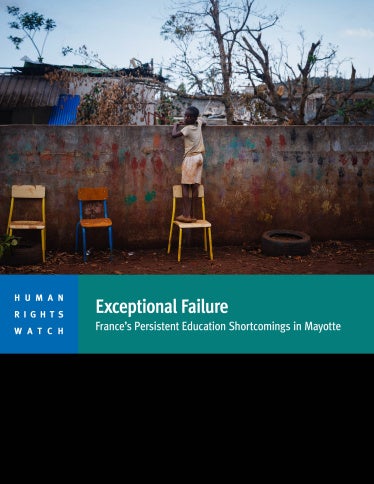
The 37-page report, “Strengthening Civilian Protection: Principles for Implementing the Declaration on Explosive Weapons in Populated Areas,” introduces seven guiding principles to help countries that have endorsed the Political Declaration on the Use of Explosive Weapons in Populated Area put their commitments into practice. Civilians make up the vast majority of casualties caused by the use of explosive weapons—such as aerial bombs, rockets, missiles, and artillery and mortar projectiles—in populated areas. Explosive weapons also turn urban areas into rubble, destroy infrastructure, and damage the environment and cultural heritage.
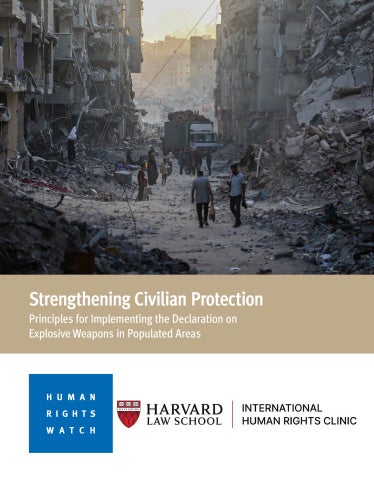
The 51-page report, “Protected No More: Uyghurs in Türkiye,” finds that Uyghurs’ previous access to international protection status, and indeed preferential treatment under the Turkish immigration system, is being nullified as authorities arbitrarily mark their police and immigration records with “restriction codes,” denoting them a “public security threat.” The government detains some Uyghurs in inhumane and degrading conditions, and coerces them to sign voluntary return forms, putting them at risk of removal to third countries that have extradition agreements with China.
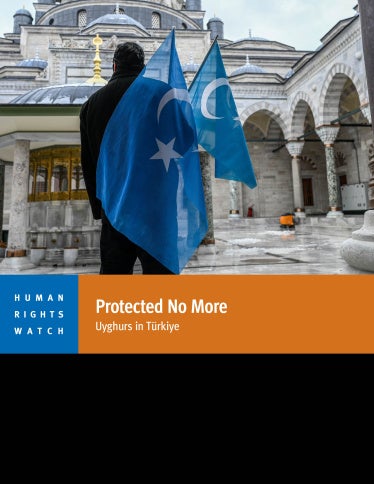
The 81-page report, “‘You Have Arrived in Hell’: Torture and Other Abuses Against Venezuelans in El Salvador’s Mega Prison,” provides a comprehensive account of the treatment of these people in El Salvador. In March and April 2025, the US government sent 252 Venezuelans, including dozens of asylum seekers, to the Center for Terrorism Confinement (Centro de Confinamiento del Terrorismo, CECOT) mega prison in El Salvador, despite credible reports of serious human rights abuses in El Salvador’s prisons. The Venezuelans were subject to refoulement—being sent to where they would face torture or persecution—arbitrary detention, enforced disappearance, torture, inhumane detention conditions and, in some cases, sexual violence.

The 75-page report, “No Money, No Care: Obstetric Violence in Sierra Leone,” documents cases of verbal abuse, medical neglect, and abandonment of women and girls facing serious obstetric complications, practices that experts interviewed say are common. Many women interviewed said they were shamed and mistreated by healthcare providers for expressing pain, needing help, or for not having enough money to pay fees. Others described humiliating experiences in which healthcare providers treated them brusquely or withheld important health information. Some cases documented constitute obstetric violence, a largely unaddressed form of gender-based violence prevalent across the world.

The 26-page report, “You’ll Die Waiting for Justice,” confirms that the Royal Eswatini Police Service and the Umbutfo Eswatini Defence Force improperly used tear gas, and rubber bullets, and physically assaulted civilians during the June 2021 unrest. The security forces also shot indiscriminately at protesters and passers-by with live ammunition, killing scores of protesters and injuring hundreds more, including children. The findings shine a spotlight on the absence of accountability since then and the precarious and desperate situation for the victims, requiring urgent action to remedy their situation.

The 89-page report, “Whose Abortion Is It? The Harms of State-Mandated Parental Notification for Abortion and Judicial Bypass in the United States,” documents how state-mandated parental notification laws in six US states threaten young people’s health and safety and undermine their human rights. Most young people considering abortion involve a parent in their decision. Those who do not often have no access to a parent or fear that parental involvement will lead to severe consequences, such as physical abuse, loss of housing, family alienation, or forced continuation of a pregnancy against their wishes. The alternative to notifying a parent involves petitioning a judge for a court order in an invasive, stressful, and often traumatizing process called “judicial bypass.”

The 86-page report “Tainted: JBS and the EU’s Exposure to Human Rights Violations and Illegal Deforestation in Pará, Brazil,” details how cattle ranchers illegally seized land and devastated the livelihoods of lawful residents in the Terra Nossa smallholder settlement and the Cachoeira Seca Indigenous territory, affecting their rights to housing, land, and culture. Human Rights Watch analysis of official sources shows that illegal farms in these areas sold cattle to several JBS direct suppliers.

The 101-page report, “Tax Giveaways, Struggling Schools: How Low Taxes Drove Sri Lanka’s Economic Crisis and Squandered its Education Lead,” describes how Sri Lanka’s successive governments have adopted policies that resulted in inadequate revenues, contributing not only to Sri Lanka defaulting on its debt but also to a decades-long decline in public education spending as a share of Gross Domestic Product (GDP) to among the lowest in the world. It also documents the impacts of inadequate funding on children’s right to education. Moreover, low corporate and personal tax revenues have led to an average of 80 percent of taxes coming from goods and services, which generally are regressive because they claim a higher share of poorer people’s income.

The 120-page report, “Debt Traps: Predatory Microfinance Loans and the Exploitation of Cambodia’s Indigenous Peoples,” documents that over-indebtedness among Indigenous communities in Cambodia’s northeastern provinces has led to coerced land sales, debt-driven suicides, food insecurity, and loss of access to health care and education. Cambodian microfinance institutions (MFIs) have routinely issued loans to Indigenous borrowers through credit officers and loan documents using Khmer, a language many Indigenous people do not understand, for amounts far exceeding their ability to repay.
